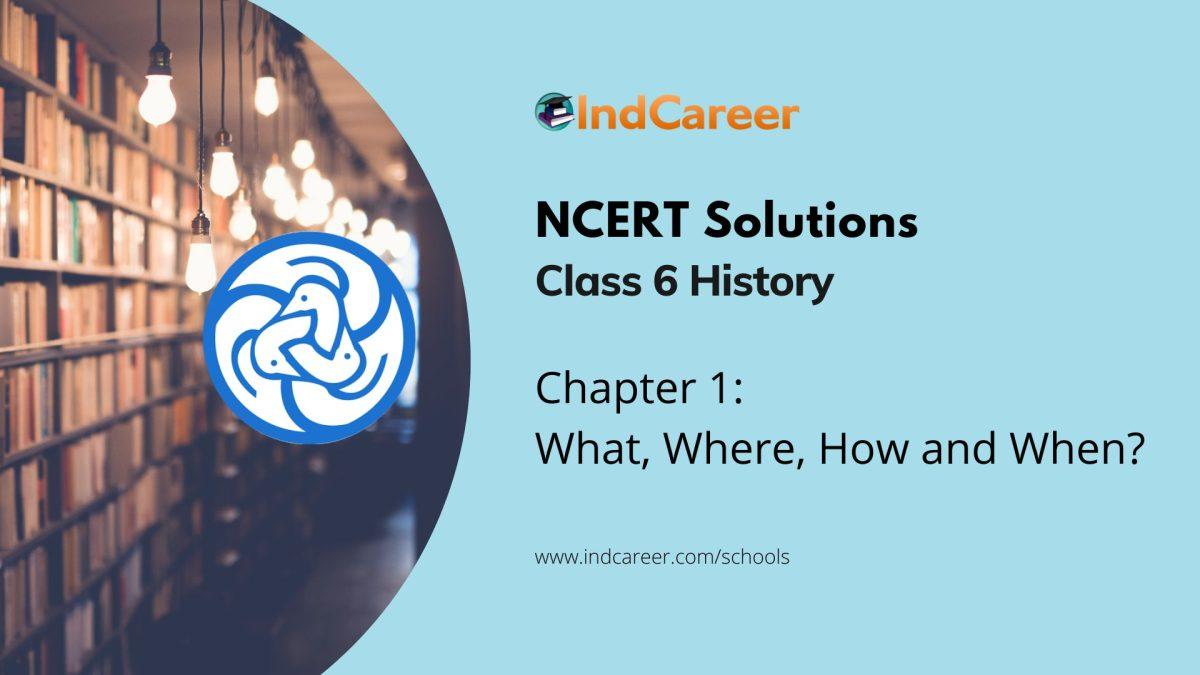Class 6: History Chapter 1 solutions. Complete Class 6 History Chapter 1 Notes.
Contents
NCERT Solutions for 6th Class History: Chapter 1-What, Where, How and When?
NCERT 6th History Chapter 1, class 6 History Chapter 1 solutions
Page No: 9
Imagine
You have to interview an archaeologist. Prepare a list of five questions that you would like to ask her/him.
Answer
List of five questions are:
• What is archaeology?
• What is the importance of archaeology?
• How do archaeologists gather data?
• What are the various types of archaeology?
• How archaeologist determine time-period of any finding?
NCERT 6th History Chapter 1, class 6 History Chapter 1 solutions
Let’s Recall
1. Match the following:
Narmada Valley – The first big kingdom
Magadha – Hunting and gathering
Garo hills – Cities about 2500 years ago
Indus and its tributaries – Early agriculture
Ganga Valley – The first cities
Answer
Narmada Valley – Hunting and gathering
Magadha – The first big kingdom
Garo hills – Early agriculture
Indus and its tributaries – The first cities
Ganga Valley – Cities about 2500 years ago
2. List one major difference between manuscripts and inscriptions.
Answer
Manuscripts are written by hand which were usually written on palm leaf, or on the specially prepared bark of a tree while inscriptions were engraved either on hard surfaces such as stone and metal.
NCERT 6th History Chapter 1, class 6 History Chapter 1 solutions
Let’s Discuss
3. Return to Rasheeda’s question. Can you think of some answers to it?
Answer
Rasheeda’s question is, “How could anyone know what had happened so many years ago?” We can know what had happened so many years ago by reading books which were based upon findings by historians and archeologists through past remains such as manuscripts, inscriptions, tools, weapons, etc.
NCERT 6th History Chapter 1, class 6 History Chapter 1 solutions
Page No: 10
4. Make a list of all the objects that archaeologists may find. Which of these could be made of stone?
Answer
List of all the objects that archaeologists may find are:
• Remains of buildings
• Paintings and sculpture
• Tools
• Weapons
• Pots
• Ornaments
• Coins
• Bones of birds, animals, fish etc.
Tools, weapons, sculpture, could be made of stone.
5. Why do you think ordinary men and women did not generally keep records of what they did?
Answer
The ordinary men and women did not generally keep records of what they did because they weren’t doing any notable works. They are living their ordinary life also they didn’t know about reading and writing.
6. Describe at least two ways in which you think the lives of kings would have been different from those of farmers.
Answer
Two ways in which the lives of kings are different from farmers:
• Farmers had to work in their field while king’s duty was to protect his citizen.
• Kings fought battles and kept records of their victories while farmers led their ordinary life and they didn’t keep any record.
Let’s Do
7. Find the word crafts persons on page 1. List at least five different crafts that you know about today. Are the crafts persons — (a) men (b) women (c) both men and women?
Answer
Weaving, Carpentry, Dyeing, Pottery-making, Carpet-making are five crafts that exist today. In today’s world, both men and women are crafts persons.
8. What were the subjects on which books were written in the past? Which of these would you like to read?
Answer
The books which are in the past dealt with all kinds of subjects such as religious beliefs and practices, the lives of kings, medicine and science. Also, epics, poems, plays were written. I would like to read (name of your book).
NCERT 6th History Chapter 1, class 6 History Chapter 1 solutions
NCERT Solutions for 6th Class History: Chapter 1: Download PDF
NCERT Solutions for 6th Class History: Chapter 1-What, Where, How and When?
Download PDF: NCERT Solutions for 6th Class History: Chapter 1-What, Where, How and When? PDF
Chapterwise NCERT Solutions for Class 6 History :
- Chapter 1 What, Where, How and When?
- Chapter 2-On the trail of the earliest people
- Chapter 3-From gathering to growing food
- Chapter 4 In the Earliest Cities
- Chapter 5 What Books and Burials Tell Us
- Chapter 6 Kingdoms, Kings and An Early Republic
- Chapter 7 New Questions and Ideas
- Chapter 8 Ashoka The Emperor Who Gave Up War
- Chapter 9 Vital Villages, Thriving Towns
- Chapter 10 Traders Kings and Pilgrims
- Chapter 11 New Empires and Kingdoms
- Chapter 12 Buildings, Paints and Books
About NCERT
The National Council of Educational Research and Training is an autonomous organization of the Government of India which was established in 1961 as a literary, scientific, and charitable Society under the Societies Registration Act. Its headquarters are located at Sri Aurbindo Marg in New Delhi. Visit the Official NCERT website to learn more.
